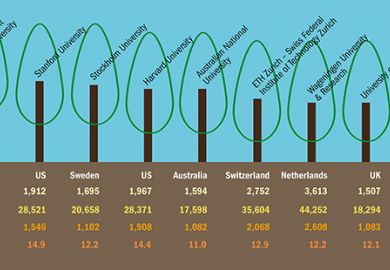A scholar who played a crucial role in forging the discipline of global environmental history has died.
Richard Grove was born in Cambridge on 21 July 1955 and studied geography at the University of Oxford (1979) before going on to an MSc in conservation biology at UCL (1980) and then a PhD at the University of Cambridge (1988). This involved visiting archives in Africa, India, the West Indies and the Indian Ocean region, which led him to his pioneering claim that early environmental thinking had been deeply shaped by colonialism, as well as to concerns about deforestation in the tropics and contact with indigenous ideas. This analysis was later distilled into his epoch-making book, Green Imperialism: Colonial Expansion, Tropical Island Edens and the Origins of Environmentalism, 1600-1860 (1995) and other publications.
After several years at Cambridge, Professor Grove decided to base himself in Australia and the US, where environmental history was then being studied much more intensively. He spent the period from 1993 to 2001 at the Australian National University, although he combined this with shorter fellowships at leading US institutions and also maintained close links with the Jawaharlal Nehru University in India.
He became increasingly concerned about climate change, particularly the long-term impact of El Niño, and co-edited a collection with John Chappell, El Niño: History and Crisis (2000). George Adamson was later able to incorporate further material into a book titled El Niño in World History (2018).
In 2002, Professor Grove and his wife, Vinita Damodaran – now professor of South Asian history at the University of Sussex – set up the world’s first Centre for World Environmental History at Sussex.
Tim Bonyhady, director of the Centre for Law, Arts and the Humanities at ANU, described Professor Grove as “a remarkable activist, intense anti-authoritarian, great adventurer, exceptional explorer of archives and stellar academic who sometimes made life more chaotic but always made it wonderfully richer. Like many others, I have been inspired by him. I would not have written my Australian environmental history The Colonial Earth without Richard’s Green Imperialism. A postcard that I received from him in 2005 from the island of St Helena – written after he sailed there from Namibia – is for me expressive of much about him: ‘Many rare things here. Archives good.’”
Professor Grove returned to ANU in 2006 to take up a prestigious professorship, but a motor vehicle collision in the same year left him incapacitated. He died of an aortic rupture on 25 June and is survived by Professor Damodaran and their son Edwin.
Register to continue
Why register?
- Registration is free and only takes a moment
- Once registered, you can read 3 articles a month
- Sign up for our newsletter
Subscribe
Or subscribe for unlimited access to:
- Unlimited access to news, views, insights & reviews
- Digital editions
- Digital access to THE’s university and college rankings analysis
Already registered or a current subscriber?












